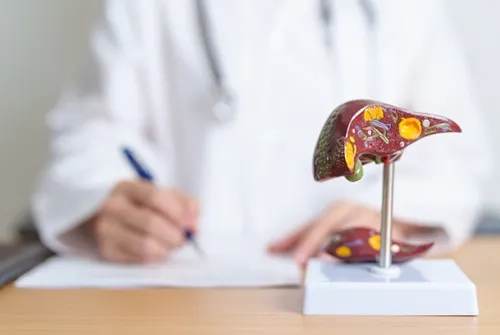Alo Yeditepe
Alo Yeditepe
What is Cirrhosis? What Causes Cirrhosis
Your original text is already quite accurate, but here's a revised version with a few minor edits:
Cirrhosis is a chronic disease of the liver and a condition that can lead to serious health problems. The liver is a vital organ that performs many important functions in the body, including toxin clearance, aiding in digestion, protein synthesis, bile production, and energy storage.
The most common cause of cirrhosis is chronic alcohol use. Prolonged excessive alcohol consumption damages liver cells and leads to inflammation. Persistent inflammation results in the formation of connective tissue (fibrosis) instead of healthy liver cells. Over time, this connective tissue spreads and causes widespread and permanent damage, ultimately leading to cirrhosis.
In addition to alcohol consumption, viral infections such as hepatitis B and C can also cause cirrhosis. These infections affect the liver, causing chronic inflammation and damage. Other conditions such as non-alcoholic fatty liver disease, autoimmune hepatitis, and hemochromatosis (iron overload) can also contribute to the development of cirrhosis.
Cirrhosis is a progressive disease that gradually impairs the normal structure and function of the liver. As connective tissue increases, it leads to permanent liver damage. Advanced liver damage can result in serious complications like liver failure, portal hypertension (high blood pressure in the liver), and liver cancer.
The treatment of cirrhosis typically involves identifying and managing the underlying cause. This includes abstaining from alcohol, receiving medication for viral infections, and considering other treatment options. In advanced cases, a liver transplant may be necessary to restore liver function.
In summary, cirrhosis is a severe liver disease often caused by chronic alcohol use, viral infections, or fatty liver disease. Early diagnosis, appropriate treatment, regular medical checkups, and a healthy lifestyle are crucial for managing this condition.
This content was prepared by Yeditepe University Hospitals Medical Editorial Board.
”
See Also
- Fall from Height Led to Kidney Failure, Saved by Sister's Donation
- What is a Liver Transplant, How is it Done? and Who is it For?
- Journey of Hope from Georgia to Turkey: 63-Year-Old Father Donates Kidney to Son
- Birthday Gift Becomes a Gift of Life: Kidney Donation from Husband of 20 Years
- Can Liver Cancer Be Prevented?
- Common Misconceptions About Kidney Transplantation
- 19 Years Old Davut MİNAZ, Who Lost 45 Kilos in 4 Months, Clung to Life with His Father's Kidney
- What are the Problems Requiring Gallbladder Surgery?
- Gallbladder Surgery is a Necessity, Not a Choice
- What is Organ Donation?
- What is Gallbladder Surgery?
- Patched Solution for Umbilical Hernia
- 10 Questions About Kidney Transplantation
- Chronic Kidney Disease and Treatment Methods
- Liver Cancer (Tumor) and Treatment
- Gallbladder Stones
- What is a Kidney Transplant?
Alo Yeditepe







